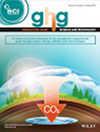求助PDF
{"title":"全面回顾二氧化碳地质封存的实验研究、数值建模、泄漏风险评估、监测和控制:对二氧化碳有效部署战略的影响","authors":"Abobakr Sori, Jafarsadegh Moghaddas, Hasan Abedpour","doi":"10.1002/ghg.2295","DOIUrl":null,"url":null,"abstract":"<p>The geological storage of carbon dioxide (CO<sub>2</sub>) represents a promising strategy for mitigating climate change by securely sequestering CO<sub>2</sub> emissions. This review article aims to provide a comprehensive overview of the current state of research and development in the field of geological carbon dioxide (CO<sub>2</sub>) sequestration. We systematically examined a wide range of recent literature, focusing on advancements in numerical simulations, experimental studies, risk assessments, and monitoring techniques related to CO<sub>2</sub> sequestration. Literature was selected based on relevance, recency, and contribution to the understanding of key challenges and solutions in CO<sub>2</sub> storage, with sources spanning peer-reviewed journals, conference proceedings, and significant technical reports. Our review highlights several key themes: the integration of machine learning and advanced numerical models in predicting CO<sub>2</sub> behavior in subsurface formations; innovative experimental approaches to understanding the physicochemical interactions between CO<sub>2</sub>, brine, and geological substrates; and the development of robust risk assessment frameworks to address potential leakage and induced seismicity. We also explore recent advancements in monitoring technologies, emphasizing their critical role in ensuring the long-term integrity and effectiveness of CO<sub>2</sub> storage sites. Overall, this review synthesizes the latest findings and identifies gaps in current knowledge, providing a roadmap for future research directions. Our aim is to enhance the understanding of CO<sub>2</sub> sequestration processes, support the development of safer and more efficient storage methods, and contribute to the global effort in mitigating climate change through effective carbon management strategies. © 2024 Society of Chemical Industry and John Wiley & Sons, Ltd.</p>","PeriodicalId":12796,"journal":{"name":"Greenhouse Gases: Science and Technology","volume":"14 5","pages":"887-913"},"PeriodicalIF":2.7000,"publicationDate":"2024-08-13","publicationTypes":"Journal Article","fieldsOfStudy":null,"isOpenAccess":false,"openAccessPdf":"","citationCount":"0","resultStr":"{\"title\":\"Comprehensive review of experimental studies, numerical modeling, leakage risk assessment, monitoring, and control in geological storage of carbon dioxide: Implications for effective CO2 deployment strategies\",\"authors\":\"Abobakr Sori, Jafarsadegh Moghaddas, Hasan Abedpour\",\"doi\":\"10.1002/ghg.2295\",\"DOIUrl\":null,\"url\":null,\"abstract\":\"<p>The geological storage of carbon dioxide (CO<sub>2</sub>) represents a promising strategy for mitigating climate change by securely sequestering CO<sub>2</sub> emissions. This review article aims to provide a comprehensive overview of the current state of research and development in the field of geological carbon dioxide (CO<sub>2</sub>) sequestration. We systematically examined a wide range of recent literature, focusing on advancements in numerical simulations, experimental studies, risk assessments, and monitoring techniques related to CO<sub>2</sub> sequestration. Literature was selected based on relevance, recency, and contribution to the understanding of key challenges and solutions in CO<sub>2</sub> storage, with sources spanning peer-reviewed journals, conference proceedings, and significant technical reports. Our review highlights several key themes: the integration of machine learning and advanced numerical models in predicting CO<sub>2</sub> behavior in subsurface formations; innovative experimental approaches to understanding the physicochemical interactions between CO<sub>2</sub>, brine, and geological substrates; and the development of robust risk assessment frameworks to address potential leakage and induced seismicity. We also explore recent advancements in monitoring technologies, emphasizing their critical role in ensuring the long-term integrity and effectiveness of CO<sub>2</sub> storage sites. Overall, this review synthesizes the latest findings and identifies gaps in current knowledge, providing a roadmap for future research directions. Our aim is to enhance the understanding of CO<sub>2</sub> sequestration processes, support the development of safer and more efficient storage methods, and contribute to the global effort in mitigating climate change through effective carbon management strategies. © 2024 Society of Chemical Industry and John Wiley & Sons, Ltd.</p>\",\"PeriodicalId\":12796,\"journal\":{\"name\":\"Greenhouse Gases: Science and Technology\",\"volume\":\"14 5\",\"pages\":\"887-913\"},\"PeriodicalIF\":2.7000,\"publicationDate\":\"2024-08-13\",\"publicationTypes\":\"Journal Article\",\"fieldsOfStudy\":null,\"isOpenAccess\":false,\"openAccessPdf\":\"\",\"citationCount\":\"0\",\"resultStr\":null,\"platform\":\"Semanticscholar\",\"paperid\":null,\"PeriodicalName\":\"Greenhouse Gases: Science and Technology\",\"FirstCategoryId\":\"93\",\"ListUrlMain\":\"https://onlinelibrary.wiley.com/doi/10.1002/ghg.2295\",\"RegionNum\":4,\"RegionCategory\":\"环境科学与生态学\",\"ArticlePicture\":[],\"TitleCN\":null,\"AbstractTextCN\":null,\"PMCID\":null,\"EPubDate\":\"\",\"PubModel\":\"\",\"JCR\":\"Q3\",\"JCRName\":\"ENERGY & FUELS\",\"Score\":null,\"Total\":0}","platform":"Semanticscholar","paperid":null,"PeriodicalName":"Greenhouse Gases: Science and Technology","FirstCategoryId":"93","ListUrlMain":"https://onlinelibrary.wiley.com/doi/10.1002/ghg.2295","RegionNum":4,"RegionCategory":"环境科学与生态学","ArticlePicture":[],"TitleCN":null,"AbstractTextCN":null,"PMCID":null,"EPubDate":"","PubModel":"","JCR":"Q3","JCRName":"ENERGY & FUELS","Score":null,"Total":0}
引用次数: 0
引用
批量引用
Comprehensive review of experimental studies, numerical modeling, leakage risk assessment, monitoring, and control in geological storage of carbon dioxide: Implications for effective CO2 deployment strategies
The geological storage of carbon dioxide (CO2 ) represents a promising strategy for mitigating climate change by securely sequestering CO2 emissions. This review article aims to provide a comprehensive overview of the current state of research and development in the field of geological carbon dioxide (CO2 ) sequestration. We systematically examined a wide range of recent literature, focusing on advancements in numerical simulations, experimental studies, risk assessments, and monitoring techniques related to CO2 sequestration. Literature was selected based on relevance, recency, and contribution to the understanding of key challenges and solutions in CO2 storage, with sources spanning peer-reviewed journals, conference proceedings, and significant technical reports. Our review highlights several key themes: the integration of machine learning and advanced numerical models in predicting CO2 behavior in subsurface formations; innovative experimental approaches to understanding the physicochemical interactions between CO2 , brine, and geological substrates; and the development of robust risk assessment frameworks to address potential leakage and induced seismicity. We also explore recent advancements in monitoring technologies, emphasizing their critical role in ensuring the long-term integrity and effectiveness of CO2 storage sites. Overall, this review synthesizes the latest findings and identifies gaps in current knowledge, providing a roadmap for future research directions. Our aim is to enhance the understanding of CO2 sequestration processes, support the development of safer and more efficient storage methods, and contribute to the global effort in mitigating climate change through effective carbon management strategies. © 2024 Society of Chemical Industry and John Wiley & Sons, Ltd.


